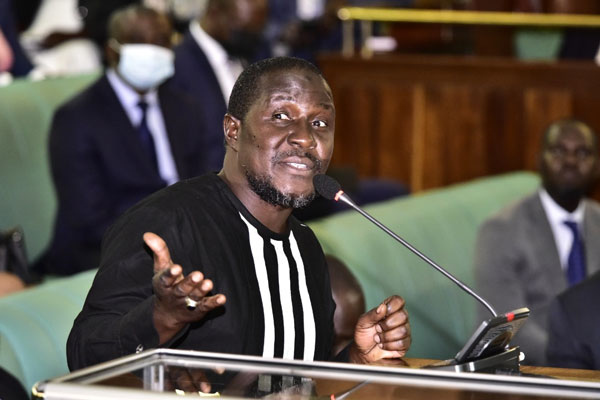
Parliament finally passes bill to criminalize LGBTQ
Kampala, Uganda | THE INDEPENDENT | Parliament on Tuesday unanimously passed the Anti-Homosexuality Bill, 2023 that criminalizes Lesbian, Gay, Bisexual, Transgender, and Queer– LGBTQ activities. Under this new law, people who publically declare that they belong to the LGBTQ community face between 2-10 years imprisonment for engaging in homosexuality, aggravated homosexuality, attempted homosexuality, aiding and abetting homosexuality, and conspiracy to commit homosexuality.
The Bugiri Municipality Member of Parliament, Asuman Basalirwa, who moved the private member’s bill first tabled the Anti-Homosexuality Bill, 2023 for its first reading on March 9 2023 before Speaker Anita Among referred it to the Legal and Parliamentary Affairs Committee for scrutiny.
After 10 days of rigorous public hearings and scrutiny, the Committee returned the Bill to the House on Tuesday for the second and third reading before it was overwhelmingly passed following seven hours of debate in which, 358 out of the 529 legislators participated.
Reiterating the overall objective of the bill, Basalirwa noted that it establishes comprehensive and enhanced legislation to protect the traditional family by prohibiting same-sex relations as well as strengthening Uganda’s capacity to deal with the emerging threats to the traditional family.
Speaking to the Bill, Basalirwa argued that the new law will protect the cherished culture of Uganda, children, and youth who are vulnerable to sexual abuse as well as prohibit same-sex marriages. The Bill prohibits and penalizes homosexuality and its related practices, the promotion of homosexuality, and protects and provides assistance and payment of compensation to victims of homosexuality.
According to the certificate of financial implication issued by Matia Kasaija, the Minister of Finance, Planning and Economic Development, the Bill aligns with the National Development Plan- NDP III to empower families to embrace national values.
We recognize that the Constitution contains non derogable rights and in this process the House has striven to recognize those non derogable rights.
However, the norms and aspirations of the people of Uganda will always remain supreme. pic.twitter.com/JiUDodSsRF
— Anita Annet Among (@AnitahAmong) March 21, 2023
However, Fox Odoi Oywelowo, the Budama North East Constituency, and his counterpart Kisoro Municipality counterpart, Paul Kwizera presented a dissenting minority report to the Bill citing duplication of several provisions in the Penal Code Act of 1950 and violations to Articles 28 and 44(c) of the Constitution. They argued that the Bill will consequently infringe on the rights of Ugandans to freedoms of expression, association, liberty, equality, privacy, and freedom from discrimination, and inhuman and degrading treatment among others.
Hon. @HonBasalirwaA has moved a motion for the third reading of the Anti-Homosexuality Bill, 2023.
Members of Parliament have voted overwhelmingly for Anti-Homosexuality Bill.
The Bill has been passed and will become law once the President assents to it.#PlenaryUg https://t.co/MumwNmPB6H
— Parliament Watch (@pwatchug) March 21, 2023
However, Anita Among the Speaker of parliament, said the house has performed its cardinal role of legislation and reiterated that no sanctions by the Europeans will shake the country’s sovereignty.
Several Civil Society activists from among others Chapter 4, Women’s Pro Bono Initiative, and law dons from Makerere University School of Law among others dissented from the Bill arguing that it will generate public hostility against sexual and gender minorities in the country.
Notably, Uganda first passed the Anti-Homosexuality law on December 20, 2013, which was tabled by the Ndorwa East Member of Parliament, David Bahati. This particular law provided a life sentence and the death penalty for offenders.
President Yoweri Kaguta Museveni signed the Act into law on 24 February 2014 but it was later annulled by the Constitutional Court on grounds that it was passed without the requisite quorum in the House. At the time, several donors in countries like Denmark, Norway, the Netherlands, Sweden, and the USA suspended aid to Uganda.
****
URN
 The Independent Uganda: You get the Truth we Pay the Price
The Independent Uganda: You get the Truth we Pay the Price



Excellent…
May the Almighty God bless the Parliament of the Republic of Uganda 🇺🇬 and bless more the madam Speaker and all the individual parliamentarians who have stood up tall and brave in support of this powerful and godly Bill which I believe will become a law as soon as our president signs it.
You men and women sitting in this parliament especially in this season have done a great job. Congratulations and you are making Uganda 🇺🇬 a very very proud country and very unique.
May God continue to use you and bless all your families and endeavours in the powerful name of Jesus Christ.
I and my family and friends here in overseas are very very proud of you our brothers and sisters in the parliament. I think this is the best legislation ever in the Nation of Uganda 🇺🇬.
You are the best. We thank God for all of you and you in particular MADAM SPEAKER ANITA AMONG. WE LOVE YOUR LEADERSHIP. PLEASE KEEP IT UP AND FEAR NOTHING. LET NO MAN OR FOREIGN COUNTRY INTIMATE YOU.
WE ARE PRAYING FOR YOU AND ALL THOSE PARLIAMENTARIANS WHO ARE LIKE-MINDED.
SHALOM…
I agree that homosexuality is a sin, but are you going to make similar laws for adulterers, people involved in fornication, pedophiles, people purchasing street hookers, people purchasing pornography (lust)? All of these are sins but some are more visible and some hidden. It should be the same across the board for all.
Just for info, adultery was actually a crime in Uganda until the Constitutional Court struck it down some years ago. Unless I am mistaken, fornication (among minors), pedophilia (sic), porn, and even selling on the streets are still criminal offences or have criminal dimensions in one way or another.
Where is the victim in this?
There is damage to body structure and an effect on the mental state
There is need for immediate medical care and management of long term effects
Who meets the bill to cater for appropriate care?
In memory of “them”
For “them” let the legal system go beyond the external environment and plan for the inner environment of the affected
What is the constitutional obligation to protect inhabitants of the land from being dehumanised
The Cohort ” them” were they Guinea pigs?
Is there a database for the outcome or it is ” silence”
For “them” was it informed consent?